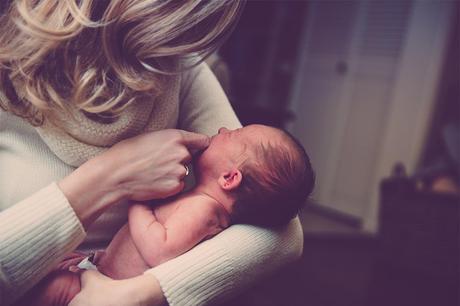
You have just gone through something absolutely amazing; you are inevitably going to feel overwhelmed, confused, and, well, absolutely exhausted. In this article, we will discuss the process immediately after giving birth. We will talk about period cycles, postnatal depression and anxiety, and what other changes you can expect your body to undergo.
With this in mind, it's clear that some stages of life are difficult to explain until you have experienced them personally. Pregnancy, and the period after giving birth, definitely fall into this category. It is hard to know what 'normal' is when every woman has completely different experiences. Both your body and mind will be reacting in a unique, and often unpredictable way.
How will my period change after giving birth?
As is to be expected, there will be a lot going on with your body, both immediately after giving birth, and over the coming weeks. Postpartum bleeding is a completely normal part of the pregnancy process that can be expected to last up to 10 days. The discharge after giving birth is known as lochia, and you can expect it to occur over three stages: in stage one (known as lochia rubra) the discharge will be red in colour and you will see It over the 3-5 days after giving birth.
The second stage, lochia serosa, will occur from 5-10 days after birth and be browner/pinkish in colour. Finally, you will reach the lochia alba stage. During this stage you can expect whiteish/yellow, creamy discharge and it can last for up to six weeks. To be prepared for these stages, make sure you have plenty of maternity towels available (take at least two packs for your trip to the hospital) - this should alleviate any unnecessary stress and anxiety related to postpartum bleeding.
Considering your periods in the long term can cause unneeded stress. It is this 'unknown' that can cause anxiety for new mums, who have enough on their plate as it is. What can be expected from you period after pregnancy varies from person to person and predicting your first post-pregnancy period is almost impossible. During your first few periods after pregnancy, you might experience:
- Stop and start periods
- Small blood clots
- Irregular cycle lengths
Unfortunately, irregularity is in the very nature of post-pregnancy periods. Your first period after giving birth Is likely to be heavy, as the amount of uterine lining that will shed is higher than usual. After this, you may experience a regular period, or it could be completely irregular. Cramps will differ in intensity, and there is no guarantee about how exactly you will experience your cycle.
Postnatal depression - is it normal?
For many women, the week after giving birth will bring on a torrent of emotions. Not only have you just experienced a life changing moment - which is always going to feel overwhelming - but your hormones and chemicals are changing at sudden rates. This chemical alteration occurs shortly after childbirth, leaving many new mums with a case of the 'baby blues'. On top of this, you are likely to be sleep-deprived and anxious about this new responsibility. Having a baby turns your life upside down; it is an incredible experience, but don't beat yourself up if it takes a while to adjust.
If these 'baby blues' last longer than a couple of weeks, you are likely to be experiencing postnatal depression. This can vary in severity and, again, there is no 'normal' way to respond. According to the NHS, signs of postnatal depression include:
- Feelings of guilt, hopelessness and self-blame
- A persistent low mood
- Loss of interest in the world around you
- Severe lack of energy
It is completely normal to feel anxiety like this after giving birth. There is a lot of pressure demanding that this miracle of life should cause pure elation, but you shouldn't feel guilty if you're feeling low.
If you think you might be suffering from postnatal depression, confide in your friends and family and don't be afraid to ask for moral or practical support. If the problem persists, contact your GP or Heath Visitor to get some medical advice.
What will happen to my skin, hair, and nails?
During pregnancy, nail growth is accelerated, sometimes causing brittle nails that will break easily. While your body is readjusting after you've given birth, it is advisable to keep taking any prenatal vitamins. This way, your body has a little extra help finding a balance. Your nails should get back to their normal strength in no time!
Some of the best tips to take onboard during this postnatal period are to keep hydrated and get plenty of rest. Taking good care of your body will help tackle anxiety, as well as any aches and pains. Focus on eating a healthy balanced diet, full of fibre and vegetables. It is of utmost importance that you take good care of yourself so that you can be the best new mum possible!
As well as this, your hormones will fluctuate during and after pregnancy. As well as having an impact on your mental health, these hormonal alterations cause changes to your skin and hair. Hair loss is to be expected after pregnancy. On average, a woman loses roughly 100 hairs per day. When pregnant however, a woman's hormones limit this loss. As a result of this, more hair loss than normal is likely to occur in the weeks after giving birth.
Although this sounds daunting, take solace in the fact that there is no 'normal'. Trust your body, as it goes through some monumental changes, and focus on keeping it as strong and healthy as you can. Of course, if anything feels abnormal, or is concerning you, get in touch with your GP for further advice and consultation.
Sources:https://www.nhs.uk/common-health-questions/pregnancy/when-will-my-periods-start-again-after-pregnancy/
https://www.nhs.uk/conditions/post-natal-depression/
https://www.healthline.com/health/pregnancy/first-period-postpartum#changes-to-my-period
https://blog.pregistry.com/skin-nails-hair-pregnancy/
